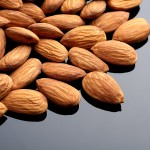 The energy content in foods (basically how many calories a food has) is chiefly determined by something called the Atwater system, which is one of two main methods used by the US Food and Drug Administration in nutrition labeling. The system was invented over 100 years ago, and is still widely used. But the Atwater system, despite how commonly used it is, may not be giving accurate calorie counts for certain food groups, including nuts. The basic science behind the measurement of a food’s energy content takes into account the amount of heat produced when a sample of the food is tested in a bomb calorimeter, as well as the food’s digestibility. Many food groups are assigned what’s known as a coefficient of fat digestibility of 90 percent, and a heat of fat combustion of 9.3 kcal/g in the Atwater system. This basically means a gram of fat is considered to have about 9 calories. However, research has surfaced suggesting that the digestibility of fat from whole nuts might be much lower than that for other food groups. What scientists just discovered about almonds, is an example of the possible mis-calculation of their calories:
The energy content in foods (basically how many calories a food has) is chiefly determined by something called the Atwater system, which is one of two main methods used by the US Food and Drug Administration in nutrition labeling. The system was invented over 100 years ago, and is still widely used. But the Atwater system, despite how commonly used it is, may not be giving accurate calorie counts for certain food groups, including nuts. The basic science behind the measurement of a food’s energy content takes into account the amount of heat produced when a sample of the food is tested in a bomb calorimeter, as well as the food’s digestibility. Many food groups are assigned what’s known as a coefficient of fat digestibility of 90 percent, and a heat of fat combustion of 9.3 kcal/g in the Atwater system. This basically means a gram of fat is considered to have about 9 calories. However, research has surfaced suggesting that the digestibility of fat from whole nuts might be much lower than that for other food groups. What scientists just discovered about almonds, is an example of the possible mis-calculation of their calories:
A new study provided evidence of the inaccuracies of the Atwater factors in calculating the energy content, or calories, in nuts. It showed that when applied to almonds, the Atwater factors overestimated the measured energy content by 32 percent. The energy content of almonds was found to be about 129 calories in a 28 gram serving, which is about a quarter cup. This is significantly less than the energy density of the same serving as determined by the Atwater factors, which says the 28 grams of almonds has about 170 calories.
The study’s findings have significant implications for dieters. When 3 ounces of almonds were added to the participants’ daily diet, the energy digestibility of the diet as a whole declined 5 percent. This means that for people with energy intakes between 2000 and 3000 kcal/day, incorporating 3 ounces of almonds into their daily diet – in exchange for more highly digestible foods – would result in a reduction of available energy of 100–150 kcal/day (meaning they effectively would be consuming 100 – 150 fewer calories). This deficit could result in more than a pound of weight loss per month.
“Almonds are high in fiber, protein, monounsaturated fat and are rich in antioxidants,” said Dr. Val Andrei, expert weight loss surgeon in New Jersey. “They are an excellent snack since they have a low glycemic index, which can help control blood sugar. They provide meaningful nutrition in small quantity to Bariatric patients; they can be eaten alone or as part of a high protein, low carbohydrate meal.”
Related Reading:






Nutrition & Lifestyle